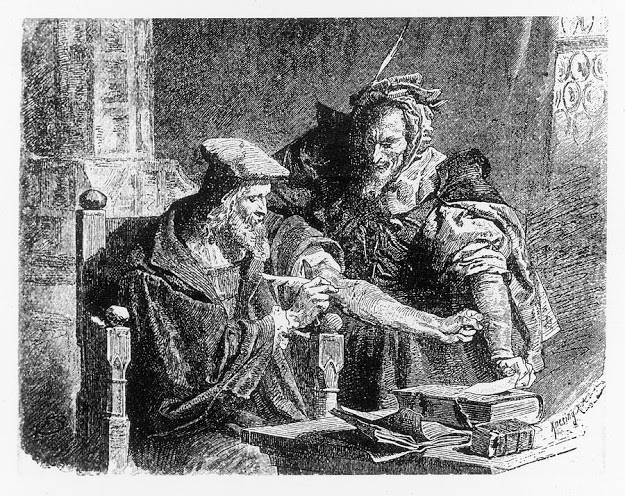We Are Not Like Many, Peddling
During the summers of my youth, I was permitted great freedom to run through the woods and the desert with a rifle and a fishing pole in hand, to spend those hot, long afternoons at the pool in the company of friends, and to generally run about wherever my adventure-seeking heart might direct, but in one aspect there was no leeway for freedom or negotiation: I was required by my mother to read one book every two weeks, and it was required to be a book that was substantive for my age, no doubt as a means of torture and recompense for the misdeeds of my youth which my mother daily and rightly suspected but could not prove. I was allowed to pick from any book in our home which, after completing, was to be discussed at length with my mother. If it ever became apparent that I had not read the book and was trying to sell smoke as it were, I would have been required to read the entire text out loud to her. In my youthful albeit appropriate grasp of common sense, I decided that it was wise to never test her resolve on the matter. It was in just such a time of enforced servitude to the written word, in the summer between the eighth and ninth grades, that I remember reading the story of Faust for the first time.
Although the English writer and dramatist Christopher Marlowe first penned the Tragical History of Doctor Faustus from a Christian perspective that examines the conflict between Christianity and the magic arts with the consequences of sin and the refusal to repent upon the protagonist as the foremost lesson of the text, the German Romantic playwright and poet Johann Wolfgang von Goethe (1749-1832) took up the subject of Faust two centuries later with a decidedly different twist. In Goethe’s two-part Faustian tale, the protagonist makes a pact with the devil that will provide him with a life replete with the fleshly satisfaction of moral degradation and the living of a thoroughly ruinous existence after which Faust’s soul would be required of him. Despite this wickedness, Goethe's character is redeemed at the end in a fashion that contradicts sound biblical doctrine. There is much more to this cautionary tale, and any serious student of Western culture and the Christian worldview should invest the time to read this classic, but the application of Faust to our current Christian experience is of particular interest in this moment in history.
In Goethe’s Faust, the main character uses and abuses people and natural resources, ignoring the need for common respect of other human beings, and working out his own hedonistic ends to the detriment and demise of those around him. In sum, Faust destroyed those who could serve as grist for the grinding mill of his carnal desires. While this well-known tale is a commentary on the dangers of the explosion of the sciences and the Industrial Revolution two centuries ago, we must not accept so simple an interpretation as to suppose that Faust is not meaningful to us today.
Western culture is awash in a Faustian sea of talking heads and political players who grind up and throw away people as a daily matter of course, for whom the destruction of lives and souls is a means to an end. Presently, these influence peddlers are working feverishly to foment and perpetuate the violent and racial division of the American people. The Faustian question that faces us as Christians is whether we are going to allow the temporal issues plaguing our culture and society, as important as they are, to supplant the primacy of the Gospel of Jesus Christ in our lives. Certainly Christians are to have a voice in such matters, but our voices must be those that bring the Christian worldview to bear upon difficult times, which inherently means that we must bring the message of Christ’s atoning work on the cross to those whose lives are subjected to the unrestrained consequences of sin. We are not peddling semantics here. We are neither accepting nor dismissing the severity of what is wrong in our society. Rather, we recognize that solutions are mere band aids applied to the mortal wound of human depravity. Failure to recognize this reality would be to close our eyes in acceptance of a facile interpretation of what is really going on around us. Indeed, the brokenness of the human condition, that humanity is dead in sin apart from the salvific work of Christ to redeem fallen human beings, is unquestionable, and He is the only remedy for what ultimately ails our souls.
If you believe yourself to be a Christian, then your obedience to share the Gospel of Christ with unbelievers and to make disciples of Jesus as commanded by God in Matthew 28:19-20 is a non-negotiable imperative. Dear saints, we are not peddling what we believe is a good solution for our problems. We are sharing the only solution for all of humanity: Jesus Christ. The only question that remains to be answered is are we going to lose our witness in the cacophony of worldly voices that achieve nothing of worth in the scope of eternity or are we going to obey the Lord as faithful witnesses who share the Gospel and makes disciples?
“For we are not like many, peddling the word of God, but as from sincerity, but as from God, we speak in Christ in the sight of God.” (2 Corinthians 2:17 NASB)



Comments
Post a Comment